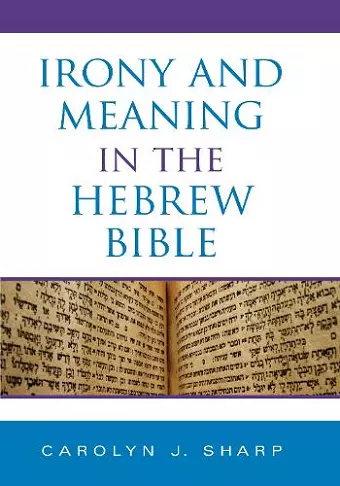Irony and Meaning in the Hebrew Bible
Format:Hardback
Publisher:Indiana University Press
Published:23rd Dec '08
Currently unavailable, and unfortunately no date known when it will be back

A sophisticated, provocative reading of the Hebrew Scriptures
Illumines the power of the unspoken in a variety of texts from the Pentateuch, the Prophets, and the Writings. This work argues that reading with irony in mind creates a charged and open rhetorical space in the texts that allows character, narration, and authorial voice to develop in unexpected ways.
Was God being ironic in commanding Eve not to eat fruit from the tree of wisdom? Carolyn J. Sharp suggests that many stories in the Hebrew Scriptures may be ironically intended. Deftly interweaving literary theory and exegesis, Sharp illumines the power of the unspoken in a wide variety of texts from the Pentateuch, the Prophets, and the Writings. She argues that reading with irony in mind creates a charged and open rhetorical space in the texts that allows character, narration, and authorial voice to develop in unexpected ways. Main themes explored here include the ironizing of foreign rulers, the prostitute as icon of the ironic gaze, indeterminacy and dramatic irony in prophetic performance, and irony in ancient Israel's wisdom traditions. Sharp devotes special attention to how irony destabilizes dominant ways in which the Bible is read today, especially when it touches on questions of conflict, gender, and the Other.
Carolyn J. Sharp suggests that many stories in the Hebrew Scriptures may be ironically intended. Interweaving literary theory and exegesis, Sharp argues that reading with irony in mind creates a charged and open rhetorical space in the texts that allows character, narration, and authorial voice to develop in unexpected ways. Main themes explored here include the ironizing of foreign rulers, the prostitute as icon of the ironic gaze, indeterminacy and dramatic irony in prophetic performance, and irony in ancient Israel's wisdom traditions. Sharp devotes special attention to how irony destabilizes dominant ways in which the Bible is read today, especially when it touches on questions of conflict, gender, and the Other.
* Shofar *Author Carolyn J. Sharp, an associate professor of Hebrew Scriptures at Yale Divinity School, suggests that many stories in the Hebrew Scriptures may be ironically intended. In her new IU Press book, Irony and Meaning in the Hebrew Bible, she deftly interweaves literary theory and exegesis, while illuminating the power of the unspoken in a wide variety of texts from the Pentateuch, the Prophets and the Writings. She argues that reading with irony in mind creates a charged and open rhetorical space in the texts that allows character, narration and authorial voice to develop in unexpected ways. Main themes explored include the ironizing of foreign rulers, the prostitute as an icon of the ironic gaze, indeterminacy and dramatic irony in prophetic performance, and irony in ancient Israel's wisdom traditions. Sharp focuses on how irony destabilizes dominant ways in which the Bible is read today, especially when it touches on questions of conflict, gender and the Other. She is also the author of Prophecy and Ideology in Jeremiah: Struggles for Authority in the Deutero-Jeremianic Prose and Old Testament Prophets for Today.
-- Steve Hinnefeld * IU News Room, Book Marks *'Universes hang in the balance with every act of reading an ironic sacred text'—this first line of the first chapter is the book's 'White Rabbit,' which instantly seduces the reader to follow the author into a newly-charted wonderland of biblical rhetoric. Highly recommended . . . .Sept./Oct. 2009
-- Dr. Yaffa Weisman * Hebrew Union College, Los Angeles, CA *[This book] offers a fascinating exploration of the the presence and the power of irony in the Hebrew bible.Summer 2009
-- Tony Cartledge * Campbell University Divinity SchoISBN: 9780253352446
Dimensions: unknown
Weight: unknown
376 pages